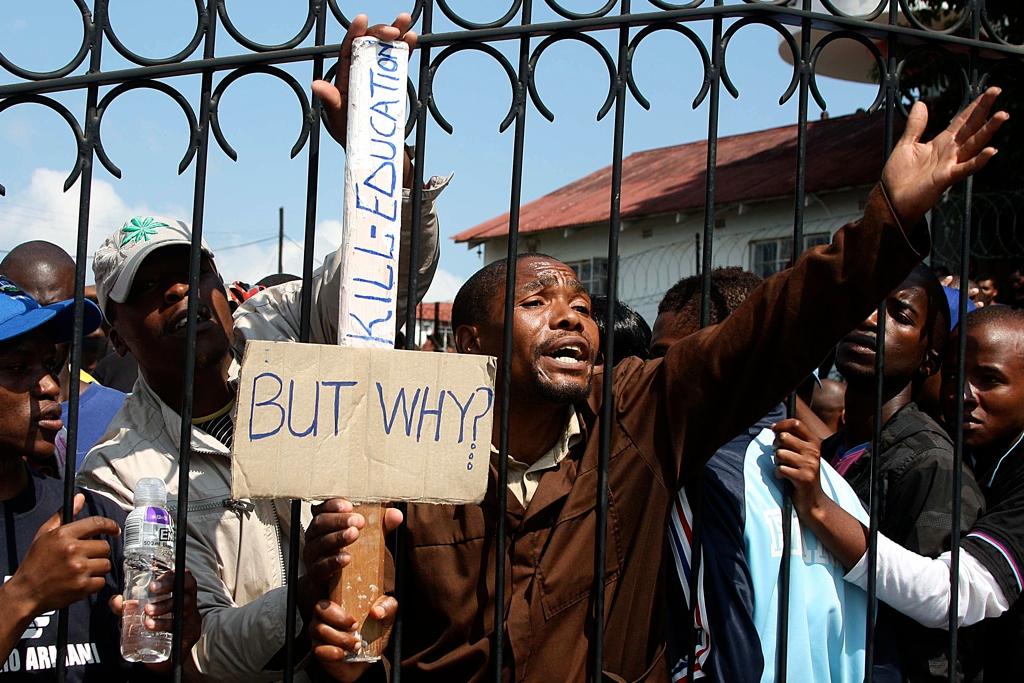Swaziland: King Mswati challenged by economic crisis
University of Swaziland students locked inside the campus ask police officers to let them out during a protest in Mbabane on November 3, 2011. Hundreds of Swazi students gathered outside state offices in the capital, Mbabane, to demand that the cash-strapped government pay their three-month overdue meal allowances. Armed police locked the crowd of around 300 students inside the University of Swaziland for half an hour before letting them march down a back street.
MANZINI, Swaziland — Every year, the ruler of Africa’s last absolute monarchy goes into seclusion, a traditional cleansing ritual that lasts for months and effectively shuts down the government in his absence.
King Mswati III’s latest seclusion at one of his many lavish palaces came at a time when Swaziland was nearly collapsing from a crippling financial crisis, sparking protests and the biggest-ever challenge to the king’s 25-year reign.
As the king returns to public this month, and as the crisis continues, he is facing fresh calls from activists and union leaders to loosen his grip on power.
While Mswati, his 13 wives and sprawling family have remained unscathed by the government’s severe budget shortfall, ordinary Swazis from all parts of society are suffering.
There is a shortage of antiretroviral drugs, which is a serious problem as Swaziland has the world's highest HIV infection rates at 25 percent of the adult population.
Hundreds of university students had to quit their studies because government scholarship payments didn’t arrive. Elderly people have gone hungry when they couldn’t plant their staple crops because old-age pension payments arrived late.
Kholwane Primary, a rural school near the city of Manzini, was forced to close early for the December break because there was no money for clean drinking water, or for lunches for the children who need full stomachs to take their antiretroviral drugs.
The school’s principal, Simangele Mmema, said that many of these children also have nothing to eat at home, and were fainting from hunger during morning assembly.
"Sometimes I break down," Mmema said. "I break down and cry."
"In democratic states, the government should have said, we failed, and then resigned. But not in Swaziland," she added.
More from GlobalPost: Swaziland activists accuse Coca-Cola of supporting King Mswati
While the king blames the global economic crisis for the country’s problems, the major cause was reduced revenues from the regional customs union, which is the government’s main source of income.
Despite the economic crisis, King Mswati, whose personal fortune is estimated to be $200 million, has continued to spend public money on vanity projects: paving private royal roads, building new palaces for his wives, constructing a massive conference center next to one of the palaces, and even a new airport with a separate terminal for royalty.
Swaziland, a tiny, landlocked nation, has a population of 1.4 million, with two-thirds of Swazis living on less than $1 a day. Life expectancy is just 48.
Mswati, who has ruled the country since 1986, has benefited from a genuine love and reverence for the king among Swaziland’s largely traditional and rural people. At school, children learn to sing praise songs for the king, starting at a young age.
Many Swazis refuse to talk ill of Mswati, and credit him with keeping the country stable.
But in the past year, this system of blind loyalty to an absolute ruler has started breaking down. Critical opposition is amassing against Mswati, and his subjects are no longer afraid to speak out.
Early last year, when the Arab Spring revolutions broke out in North Africa and the Middle East, Swaziland’s activists and trade unions took to the streets in Manzini, the largest city, and Mbabane, the capital, to protest for democracy. Security forces rapidly clamped down on the dissent.
But different forms of protests continued through the year. Lawyers boycotted the courts for four months to protest the king’s judicial interference. Public servants, a major force in the country, threatened to strike if they didn't get their salaries on time, requiring Swaziland to request money from South Africa and then eventually take out bank loans.
Related: Swaziland angry with King Mswati and his 13 wives (VIDEO)
Mswati came out of seclusion in late December to give his annual State of the Kingdom address to hundreds of traditional warriors at an isolated royal village. He blamed “jealous” foreigners for Swaziland’s economic troubles.
But the IMF has said that Swaziland could afford to pay its public servants if it spent less on the army, the police, and allowances for politicians.
Already, protests are being planned through Facebook groups for April 12, the anniversary of the 1973 banning of political parties, a ban which is still in place. Last year’s April 12 marches drew thousands of people, although the pro-democracy movement failed to snowball.
Sibongile Mazibuko, president of the Swaziland National Association of Teachers, has been detained and interrogated by police, and prevented from traveling to pro-democracy marches, but she refuses to be cowed.
In a recent barnburner of a speech, she told a meeting of union members that the king could end up like Muammar Gaddafi, being fished out of a gutter, if he doesn’t allow democracy.
"I am ready to pay with my blood for democracy," she told the cheering teachers.
Mazibuko said the system in Swaziland is worse than that of apartheid South Africa. During apartheid, Swaziland was a bastion of freedom for South Africans looking to escape white minority rule.
"People are fearful. They do not criticize the king openly. But people have told me: ‘go on, don't give up the struggle’ — including people close to the king,” she said.
“But they are so fearful. They have to be fearless."
Mazibuko added: "I will say things and face the consequences, or people will perish."
More from GlobalPost: Why is South Africa bailing out Swaziland?
